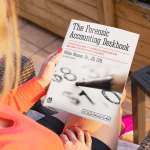Big Divorce Mistake #8: Being Cheap & Not Hiring a Forensic Accountant

The Forensic Accounting Deskbook by Miles Mason, Sr. JD, CPA, published by the ABA Family Law Section
Separate vs. marital property determinations are on the heart of many divorces. Forensic accountants can make the difference in analyzing important factual arguments and documents needed to win in negotiations and the court room.
For a much more detailed discussion, see The Forensic Accounting Deskbook: A Practical Guide to Financial Investigation and Analysis for Family Lawyers, Second Edition, authored by Miles Mason, Sr. and published by the ABA Family Law Section. This updated edition of one the ABA’s most popular resources explains the practice of forensic accounting and business valuation and how to apply it in family law cases. It provides a practice-focused introduction to the core financial concepts in divorce, such as asset identification, classification, and valuation, income determination, expenses, and more.
VIDEO TRANSCRIPT:
Tracy Coenen: Miles, can you explain the difference between separate property and marital property, also called community property?
Miles Mason: Yes. The main important difference is that marital property and community property will be divided in a divorce. Separate property will not, and whoever has the separate property will be awarded that. In general, marital property is everything that was acquired during the marriage and/or earned during the marriage, and in community property states, which I think there are six, everything earned during the marriage is presumed to be owned together and subject to division.
In general, this is all going to be controlled by state statutes and for forensic accountants, it’s not a really hard concept. You get your state law, you read it, work through the issues with your lawyer, and in general a forensic accountant’s going to be very, very comfortable working with determining the differences between marital and separate property.
As an example, inheritance that’s not commingled is going to be separate property, and forensic accountants can do a great job helping advise what is what is not commingled. Commingled in general is just putting money in a joint bank account is probably the most simple example. So following that money, possibly tracing that money, can be a defense to commingling under state law. All the work that goes into that determination is in the documents that are going to be used. Forensic accountants in general are very, very comfortable with it, because it’s the documents you use on a regular basis, whether in an audit or tax background.
Thank you to Tracy Coenen, CPA, CFF for inviting me to join her in this video series. Tracy is a nationally recognized forensic accountant practicing in Milwaukee and Chicago.









